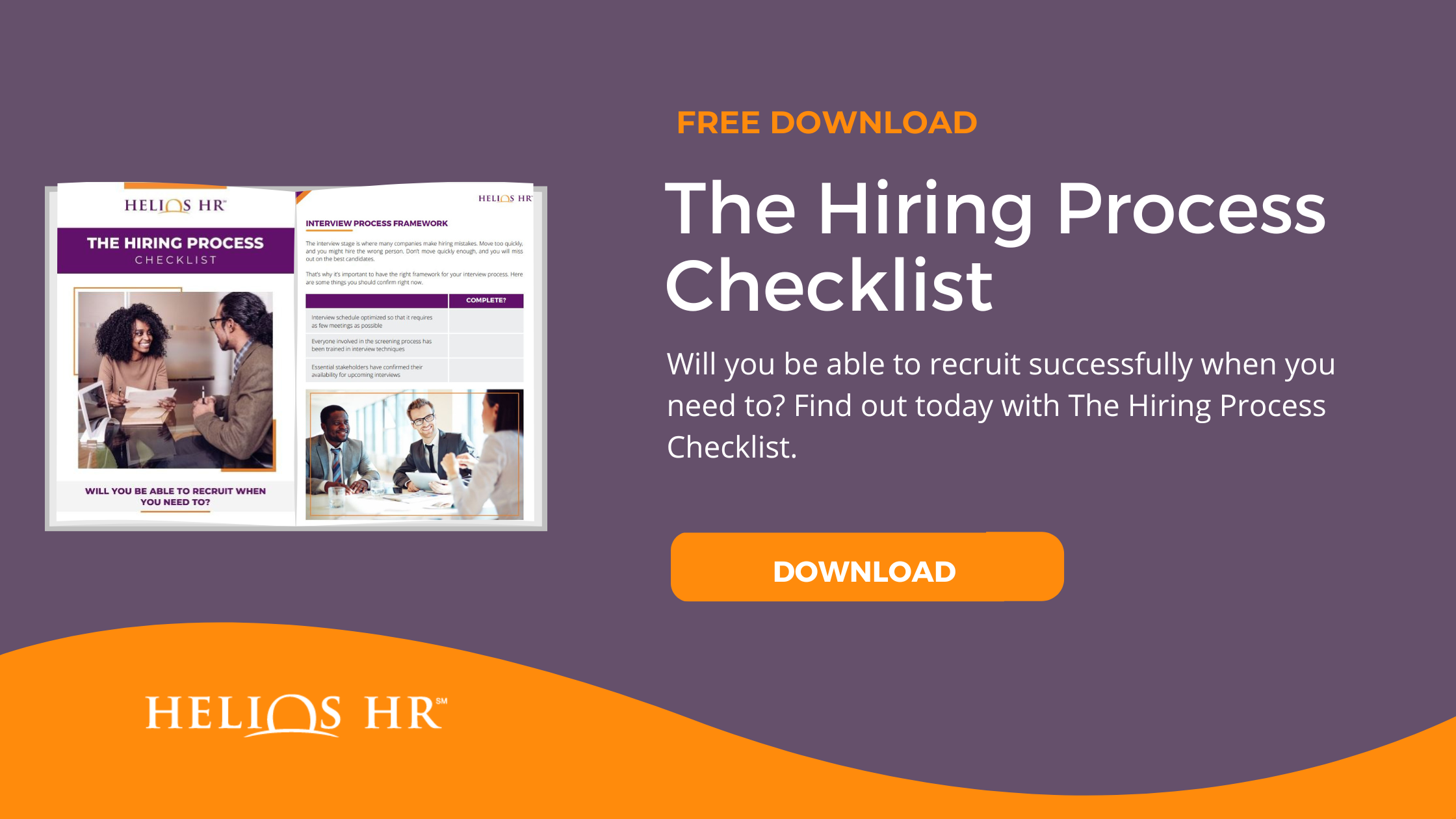By: Monica Schaus on March 14th, 2023
RPO Vs. Contingent Recruitment: What's The Difference?
When you need to add to your current team, an HR outsourcing service can help you find the right people. But you'll find that companies often offer a number of different approaches to talent acquisition, including things like Recruitment Process Outsourcing (RPO) and contingent recruitment.
Which option is right for you? It depends on your specific hiring needs, plus the healthiness of your recruitment process. In this article, we’ll explain both options, discuss the key differences, and look at how they can help you find a high-quality hire.
What is Recruitment Process Outsourcing (RPO)?
Recruitment Process Outsourcing (RPO) is a partnership with a recruitment expert. Your RPO consultant will take a hands-on role at every step of the hiring process, such as:
- Building job descriptions
- Sourcing and screening candidates
- Organizing interviews
- Fine-tuning the hiring strategy
- Compiling offers, including salaries and employee benefits
- Onboarding and integration
RPO consultants often engage with companies that don’t have enough in-house hiring expertise. The RPO expert can deliver results while also helping to design a new recruitment process. This means that RPO offers ongoing benefits—even after you’ve stopped working with the consultant.
Another common situation is project RPO, when you need to fill a number of positions in a short time. RPO is highly scalable, so you can call on consulting resources when you need them.
What is Contingent Recruitment?
Contingent recruitment is about providing you with a list of suitable candidates for your open positions. You would normally make contact with the contingent recruitment firm, and they they then go searching for the right fit.
Contingent recruitment is so-called because the fees are contingent on contingent on a successful candidate search—if they can’t find someone, you don’t pay. In some cases, the recruitment firm might offer a guarantee, which means that you’ll receive a refund if the candidate doesn’t work out.
The low costs of contingent recruitment can make it a very attractive option, especially if you need a large volume of candidates in a hurry. However, the responsibility for hiring is ultimately up to you. If your recruitment process is dysfunctional, then you’ll struggle to find the right fit.
What is the difference between RPO and Contingent Recruitment?
Recruitment Process Outsourcing and contingent recruitment vary in many ways, such as:- Relationships: RPO is a strategic partnership between a company and a third-party provider to manage the entire recruiting process, while contingent recruitment is a type of recruitment where staffing agencies fill open positions on a temporary or contract basis.
- Focus: RPO focuses on internal hiring strategies, while contingent recruitment is focused on providing suitable candidates.
- Contract: RPO can be a long-term agreement, while contingent recruitment is usually short-term, or even once-off.
- Talent acquisition strategy: Contingent recruiters select from their library of candidates, while RPO consultants might try other approaches to find the best talent, including internal recruitment.
- Ownership: RPO providers take full responsibility for the recruitment process, while staffing agencies only provide candidates.
- Cost: RPO is often more expensive than contingent recruitment due to the ongoing involvement and strategic planning, while staffing agencies don’t charge until they successfully place a candidate.
- Timeframe: RPO solutions require a longer timeframe for implementation and execution, while contingent recruitment can provide candidates at short notice.
- Focus on Quality: RPO is focused on delivering high-quality hires, while contingent recruitment leaves that responsibility to your hiring managers and recruitment teams.
- Scalability: RPO can scale its recruitment efforts to meet changing business needs, while contingent recruitment is often on an on-demand basis.
- Relationship: RPO is a long-term partnership with the provider, while contingent recruitment is often a one-time transactional relationship with the staffing agency.
As you can see, these are two different approaches. The right solution for you depends on your current talent needs.
Pros and Cons of RPO recruitment
Why choose recruitment process outsourcing? There are many benefits of rpo, including:
- Long-term recruitment strategy: Your RPO consultant will help you build internal processes that deliver consistent results. This has a long-term benefit, as you see improved results in every future hire.
- Better candidate experience: RPO consultants work to create a smoother process, which affects the overall candidate experience. Job seekers will receive better communication, more focused interviews, and improved onboarding.
- Employer branding: An RPO provider can help improve your organization's employer brand by creating a positive candidate experience throughout the recruitment process. This can lead to increased interest in your organization from top talent.
- Reduced time-to-fill: An improved hiring process delivers faster results, which means that you get the right person as quickly as possible. This takes pressure off your hiring managers and reduces the risk of missing out on your dream candidate.
- Reduced cost-per-hire: A streamlined recruitment process can offer cost savings, with lower spending on things like advertising and talent sourcing. This means a lower cost-per-hire every time you recruit.
- Best practices and IT support: RPO providers have extensive knowledge of best practices in recruitment and can share this expertise with your organization to improve your recruitment process. Your consultant will also be familiar with recruiting technology, including your Applicant Tracking System, and will help you get maximum value from these systems.
- Higher fees: RPO services can be more expensive than other recruitment solutions due to the extensive services provided.
- Potential loss of control: Outsourcing recruitment can lead to a potential loss of control over the recruitment process, which is why it’s so important to find a partner you trust.
- Collaboration issues: Any partnership depends on good communication. A successful RPO depends on your ability to work together, with RPO consultants and hiring managers constantly discussing requirements.
- Cultural misalignment: Culture fit determines whether a new hire will succeed in your organization. Your RPO provider must have a good understanding of your culture so they can identify the right fit for your team.
Pros and Cons of Contingent Recruitment
Contingent recruitment can work in lots of situations. Some of the main benefits include:
- Lower fees: Contingent recruitment is typically less expensive than other recruitment solutions because the recruiter is only paid upon successful completion of the search assignment.
- Flexibility: Contingent recruitment offers greater flexibility than other recruitment solutions, as it allows multiple agencies to compete to find the best candidate for the job.
- Utilization of multiple agencies: Because contingent recruitment allows for multiple agencies to participate in the search, organizations can benefit from the specialized expertise and networks of a wider range of recruiters.
- Faster response time: Because recruiting agencies are competing against each other to find the best candidate, the response time can be faster in contingent recruitment than in other recruitment solutions.
But you also need to be aware of the cons of contingent recruitment:
- Quantity over quality: Because contingent recruitment is based on success only, recruiters may prioritize presenting a higher quantity of candidates rather than focusing on quality.
- Limited data tracking: Because contingent recruiters are not working as closely with the organization, there may be limited data tracking and metrics available.
- Recruiter owns relationship/candidate pool: The candidate pool developed during contingent recruitment is owned by the recruiter, meaning that the organization cannot access it for future hires without the involvement of the recruiter.
- Best candidates may be directed elsewhere: Contingent recruiters decide which candidates to send your way. In some cases, they may keep their top talent for bigger clients.
By considering these pros and cons of contingent recruitment, you can make an informed decision about whether it is the right recruitment solution for your organization.
Need help with your hiring process?
Your recruitment function is one of the most important parts of your business. With the right hiring methodologies in place, you can build a talented team that delivers your strategic goals.
Helios HR’s Recruitment Process Outsourcing service can take the hassle out of hiring. Our RPO consultants can help manage a big recruitment project—or help you find efficiencies in your current hiring process.
Book a call right now with a Helios HR expert, and let’s talk about building your team.!






